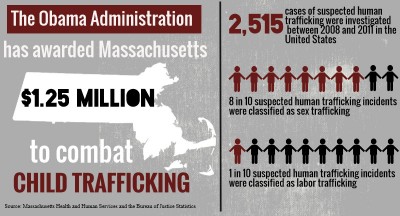
The Administration for Children and Families, housed in the U.S. Department of Health and Human Services, awarded a $1.25 million grant to children advocacy groups across the Commonwealth to enhance efforts to combat child trafficking.
The grant, which will take effect in early 2015, will be used to create a community response to the issue of child trafficking through the training of qualified professionals. By doing so, the professionals will be able to more efficiently identify the indications of a victim, said Susan Goldfarb, executive director of Children’s Advocacy Center of Suffolk County.
“This grant will help provide training and technical assistance so there is a greater awareness and that professionals around the state are better equipped, but this doesn’t pay for the actual services that will be provided to the population,” she said. “There’s absolutely a need for additional funds, both public and private, to provide the services that these kids need.”
In addition to the Children’s Advocacy Center of Suffolk County, the Massachusetts Department of Children and Families and the Justice Resource Institute will be working as the lead organizations on the grant. These large agencies will work with smaller public and private groups across the Commonwealth to combat child trafficking, according to a Nov. 24 release from the Massachusetts Executive Office of Health and Human Services.
“One of the things this grant is going to allow us to do is work with communities across Massachusetts so they do have the capacity to recognize and respond to exploited youth,” Goldfarb said.
Training for professionals working to combat human trafficking will begin in early 2015, but the federal grant is merely the beginning of funding to eradicate child trafficking, she said.
“We do it in a very coordinated way, in essence to create a safety net for high-risk and exploited youth,” Goldfarb said. “In that case, a professional has the ability to recognize the concern based on what they’re observing and what they know about the child’s experience.”
Massachusetts was one of nine recipients of the grant administered by the Administration for Children and Families, according to the release.
“With the award of this grant, the Commonwealth can continue to enhance our strong programs already in place to protect children and youth from human trafficking,” said EOHHS Secretary John Polanowicz in the release. “Keeping our children safe is the responsibility of all, and no one agency can do it alone. I thank the Obama Administration, the Justice Resource Institute, and the Children’s Advocacy Center for launching this unique partnership to protect children.”
Thomas King, executive director of the Massachusetts Children’s Alliance, emphasized the importance of the trainings and valuable conversations to disseminate educational information to at-risk teens and victims in an effort to prevent further trafficking.
“This grant will help to bring awareness and training to other areas of the state, using the expertise of Boston with the dedicated professionals doing the work now in those counties, with the latest ways to identify and properly intervene with children who are commercially sexually exploited,” King said.
Funded by the grant, training will be offered for forensic interviewers, local and state police, medical providers, mental health specialists and other professionals working with child trafficking victims. The goal of the training is to help these professionals evaluate the victims’ physical, mental and emotional health, King said.
“Children’s advocacy centers are child-friendly settings where anyone who is mandated to respond to allegations of child sexual assault can convene and interview children in what’s hopefully the most victim-focused, trauma-reducing and using the most efficient method,” he said.
King said children’s advocacy centers exist across the Commonwealth and view child trafficking as a problem that needs a team approach for finding a solution.
“It’s money that really couldn’t come from any other place,” he said. “We’re really grateful for it. The budgets are incredibly tight, so this is going to allow for the critical work to happen.”
Alexandra Roux, a sophomore in the College of General Studies, said the money awarded to Massachusetts will be put to good use.
“Where I’m from in Geneva, sex trafficking is very prominent,” she said. “It is very under the mat, and I think the situation is similar here in Massachusetts. It’s going to be a very long process, but this is a good place to start.”
Marni Sheps, a sophomore in the College of Arts and Sciences, said the grant is significant step toward combating child trafficking, but there are still substantial fields of research yet to be investigated.
“For professionals to be investigating the experiences of trafficked victims is a great start to understanding and combatting child predation and trafficking,” she said. “Eventually, professionals should focus on understanding the predators themselves.”






















































































































